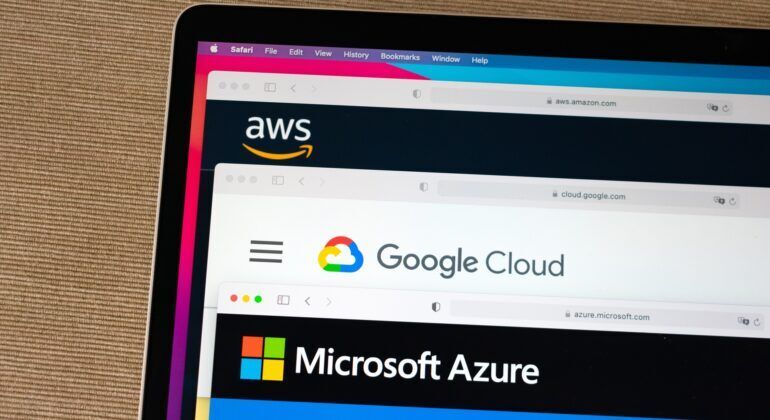Which Cloud has Better Private Connectivity: AWS or Azure or GCP?

Understanding the private connectivity models has become increasingly essential with the fast-growing adoption of multi-cloud strategies.
Various people have modified and collaborated to roll out deliverables faster in this space. However, while these actions produced excellent results, they expanded the scope for diverse issues such as connectivity breaches, data espionage, and different threats to spawn a way for policies such as DevSecOps.
While there are many security approaches, it usually boils down to keeping a secure and swift connection in this age of connectivity.
While this may seem unconventional and overrated, having a secure connection is pertinent, particularly after remote working has become a reality now.
While a fast internet connection is considered sufficient for most, it is a hint for hackers to effortlessly breach as the Wi-Fi connections at home have inadequate security. To cover this flaw, cloud providers came up with a solution to deliver an encrypted uplink for their customers.
Let’s find out which connection is better suited for you.
1. AWS Direct Connect
Amazon launched AWS Direct Connect in 2011, and it gained good traction in recent times. It is a reliable tool that delivers a secure connection from their individual data center to AWS infrastructure. What sets it apart from standard weakly secure connections is that AWS Direct Connect customers can bypass the public internet connections while establishing a link to AWS. It improves the connectivity and lowers the network costs without restricting the bandwidth.
One can configure Direct Connect with different logical connections, and it opens the gateways to AWS tools such as Elastic Compute Cloud and Relational Database Service. Moreover, this connectivity is skilled enough to manage various tasks that would require substantial and regular AWS data transfers. Hence, it is a given that Direct Connect can support lean or predictable data usage patterns.
While Direct Connect sounds like a stronger internet connection, it differs from the standard internet one uses. Direct Connect creates a separate network connection between the AWS servers and the client-server. While it sounds similar to the internet, it is different as Direct Connect doesn’t run on the internet. This element wicks away any possible internet outages or over-reliance on local internet providers as AWS has your bases covered.
Why Should One Use AWS Direct Connect
Security is one of the biggest concerns, and while outward threats continue to stop companies’ growth, internal threats are not less damaging. Employees knowingly or unknowingly throw open the doors to hackers. While many factors lead to this outcome, it is paramount to understand that data connections are easy to manipulate for wanton gains. That is one of the important reasons to get AWS Direct Connect. Moreover, AWS has a reputation as a powerful cloud platform that has attracted many cloud users.
2. Azure ExpressRoute
Whether you are using ExpressRoute Direct or the Partner model, the main components are the peerings, VNet Gateways, and the physical ExpressRoute circuit .
Each Azure ExpressRoute comes with two HA/redundancy and SLA circuits, unlike the other CSPs. Much like the AWS dedicated and hosted models, Azure has similar offerings to ExpressRoute Direct and Partner ExpressRoute.
With Azure ExpressRoute Direct, the customer owns the ExpressRoute port, and Azure provides the LOA CFA. The customer orders the fiber cross-connects in their data center.
With the ExpressRoute Partner model, the service provider connects to the ExpressRoute port. The LOA CFA is provided by Azure and given to the service provider or partner. The partner provisions the fiber cross-connects. The customer works with the partner to provision ExpressRoute circuits using the partner’s connections; the service provider owns the physical connections to Microsoft. Customers can create ExpressRoutes with the following bandwidth: 50 Mbps, 100 Mbps, 200 Mbps, 500 Mbps, 1 Gbps, 2 Gbps, 5 Gbps, and 10 Gbps .
Why Choose ExpressRoute?
Azure users don’t have to route their customer data over the unencrypted internet with ExpressRoute. Also, the ExpressRoute accepts the General Data Protection Regulation (GDPR), dismissing unwanted legal nuisances for the Azure clientele.
Moreover, Microsoft has one of the most potent footprints in the world. Microsoft’s high-speed undersea cable and other efforts ensured that its clientele enjoyed low-latency network speeds.
Another benefit is compatibility. Microsoft’s tools and operating systems are used more widely than its competitors. By using ExpressRoute, there is virtually no chance of facing compatibility issues.
3. Google Cloud Interconnect
The last, but certainly not least, CSP private connectivity that we will cover is GCP Interconnect. Luckily for us, GCP keeps its connectivity and components pretty straightforward and is arguably the simplest of the three.
It has two different tools under its Interconnect platform: Dedicated Interconnect and Partner Interconnect.
Dedicated Interconnect creates a physical uplink between the customer’s on-premises infrastructure, Google Cloud, and resources. The connection lets one move large amounts of data between the organization’s infrastructure and Google Cloud. The quick transfer of the massive amounts of data over Google’s Interconnect will dismiss the requirement to buy additional bandwidth as the connection is physical.
Partner Interconnect is another offering in the Interconnect, and it links the customer’s on-premises network and the customer’s virtual private cloud.
Unlike ExpressRoute and Direct Connect, Google’s Partner Interconnect cords third-party service providers to provide physical network connections to Google Cloud. Once the network link is installed, the user can request the Partner Interconnect connection from the service provider. With the Partner Interconnect in place, the user can start the data transfer while having the service provider’s support.
Why Choose Google Cloud Interconnect?
While AWS and Azure think that their cloud tools are omnipresent, Google recognizes the geographical constraints and leans on third-party service providers to get its clients. With the local internet provider in place, there is little effort required to establish the Interconnect connection with your on-premises.
Conclusion
All three cloud services are in coalition with their private connectivity. Everyone has their expectations based on their needs, which determines the right private connectivity tool for you. Oamii Technologies is the trusted service provider for top companies and emerging organizations. We understand customers’ requirements and recommend cost-effective solutions that don’t compromise on quality. Contact us today to determine the private connectivity tool which is right for you.
Disclaimer: The information on this website and blog is for general informational purposes only and is not professional advice. We make no guarantees of accuracy or completeness. We disclaim all liability for errors, omissions, or reliance on this content. Always consult a qualified professional for specific guidance.






